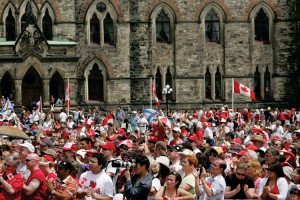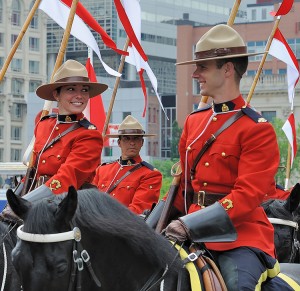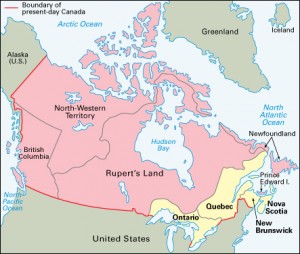Canada 150
Friday, June 30th, 2017June 30, 2017
Tomorrow, July 1, is Canada Day, and this year the holiday marks Canada’s 150th birthday. To celebrate the event, Ottawa, the Canadian capital, will host speeches, ceremonies, concerts, and a grand fireworks display. Communities across Canada have planned a wide range of activities for the big day—from a community pancake breakfast in Halifax, Nova Scotia, (don’t forget the maple syrup) to a marathon followed by the eating of a giant birthday cake in Vancouver, British Columbia. People all over the country will participate in parades, barbecues, concerts, and fireworks as Canada celebrates the sesquicentennial (150th anniversary) of Canadian Confederation.

People gather on Parliament Hill in Ottawa, Ontario, to celebrate Canada Day. Tomorrow, July 1, 2017, marks Canada’s 150th birthday. Credit: AP/Wide World
One hundred and fifty years ago, several small, separate British colonies existed in what is now eastern Canada. The west was largely unsettled by European Canadians, and the vast prairies and mountains remained the domain of indigenous (native) peoples and traders of the Hudson’s Bay Company.

Mounties of the Royal Canadian Mounted Police ride in a Canada Day parade. Credit: © William MacKenzie, Getty Images
In 1864, in an effort to consolidate British North America, leaders from the Province of Canada—a huge colony stretching from the Great Lakes along the St. Lawrence River to the Atlantic Ocean—and the Atlantic colonies of New Brunswick, Nova Scotia, and Prince Edward Island held a conference in Charlottetown on Prince Edward Island. That conference led to another meeting in Quebec City, where colonial leaders (now also including Newfoundlanders) developed the Quebec Resolutions. The resolutions outlined a federation of Canadian provinces with a strong central government which would exist within the British Empire. After a few modifications, the British Parliament approved the resolutions in the British North America Act. Canada’s four original provinces—New Brunswick, Nova Scotia, Ontario, and Quebec (the last two born of the Province of Canada)—formed the Dominion of Canada when the act took effect on July 1, 1867. Kingston lawyer and legislator John Macdonald became the new nation’s first prime minister.

Click to view larger image
In 1867, the Dominion of Canada (in yellow) included the provinces of Ontario, Quebec, New Brunswick, and Nova Scotia. The other colonies and territories of British North America (in pink) later filled out Canada’s modern borders. Credit: WORLD BOOK map
The Dominion of Canada had authority within its boundaries, but the British retained control of foreign affairs. Canada gained full independence in 1931, but it kept the monarch of the United Kingdom as its official head of state (as do many other Commonwealth nations). Later, the Constitution Act of 1982 revised and replaced the British North America Act as Canada’s basic governing document.
Tomorrow’s Canada Day festivities will be the climax of a year-long celebration called Canada 150. The four official themes of Canada 150 are “diversity and inclusion, reconciliation with Indigenous peoples, young people, and the environment.” Prime Minister Justin Trudeau will lead the ceremonies, and Prince Charles, heir to the British throne, and his wife, the Duchess of Cornwall, will be among the honored guests. Other events in the capital will include a performance by Montreal-based Cirque du Soleil and shows featuring Alessia Cara, Gordon Lightfoot, and other Canadian singers.


